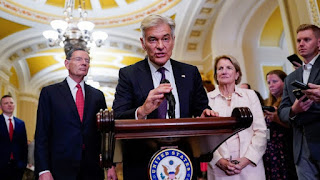WASHINGTON — President Donald Trump’s sweeping tax, spending, and policy package suffered a major legislative setback on June 26 after the Senate parliamentarian ruled that several proposed Medicaid changes cannot be included under the current reconciliation process.
The ruling by Parliamentarian Elizabeth MacDonough determined that multiple Republican-backed Medicaid provisions — which were crucial in winning over hesitant lawmakers — are subject to a filibuster and therefore require 60 votes to pass. This poses a significant obstacle in a chamber where Republicans hold a narrow 53-47 majority and are attempting to pass the bill without Democratic support.
At the center of the controversy are provisions aimed at reducing federal Medicaid spending by implementing work requirements for able-bodied adults, denying access to non-citizens, and modifying provider tax policies that fund Medicaid services like nursing homes. These measures were part of a broader Republican strategy to curb government spending and appeal to fiscal conservatives.
However, under Senate rules, known as the Byrd Rule, all items in a reconciliation bill must directly impact the federal budget. MacDonough concluded that several Medicaid provisions did not meet that requirement and therefore cannot bypass the filibuster threshold.
Democratic Opposition
Democrats welcomed the decision, framing it as a victory for vulnerable populations and a blow to what they described as a partisan and harmful policy agenda.
“Democrats are fighting back against Republicans’ plans to gut Medicaid, dismantle the Affordable Care Act, and kick kids, veterans, seniors, and people with disabilities off their health insurance — all to fund tax breaks for billionaires,” said Sen. Jeff Merkley (D-Ore.), the top Democrat on the Senate Budget Committee.
Sen. Ron Wyden (D-Ore.), ranking member of the Senate Finance Committee, added that the ruling eliminated an estimated $250 billion in savings Republicans had counted on from Medicaid cuts.
“This bill is rotten to its core, and I’ll keep fighting the cuts in this morally bankrupt bill until the end,” Wyden said.
GOP Scrambles to Respond
Republicans acknowledged the setback and now face the challenge of reworking the bill while trying to maintain party unity.
Sen. Thom Tillis (R-N.C.) said he had concerns with the now-blocked provision restricting provider taxes used by states to fund Medicaid services.
“I had some of my own concerns about it from a policy standpoint,” Tillis said, noting that while the provision’s removal may ease some opposition, it complicates efforts to reduce the deficit — a key goal for fiscal conservatives.
Sen. John Kennedy (R-La.) described the ruling as “a setback,” while Sen. Ron Johnson (R-Wis.) called it “a little bit of a hand grenade.”
With Senate leaders aiming to schedule a vote soon, the ruling has forced a last-minute recalibration of the legislative package. “I don’t think we leave until we get it done, but I’ve said for several weeks it wasn’t going to happen this week,” Tillis added.
Controversial Provisions Rejected
The parliamentarian rejected the following Medicaid-related provisions:
- Banning Medicaid participation for adults and children whose citizenship or immigration status could not be immediately verified.
- Denying eligibility to non-citizens.
- Reducing federal Medicaid matching funds from 90% to 80% for states covering undocumented immigrants.
- Prohibiting Medicaid and the Children’s Health Insurance Program from covering gender-affirming care.
- Preventing states from increasing provider taxes on nursing homes and other care facilities.
Democrats argued these measures would have resulted in millions losing coverage and reduced access to critical health services.
Republican Backlash
Some Republicans criticized the influence of the unelected Senate parliamentarian.
“The Senate Parliamentarian is not elected,” Rep. Greg Steube (R-Fla.) posted on social media. “She is not accountable to the American people. Yet she holds veto power over legislation supported by millions of voters.”
Despite the setback, GOP leaders remain determined to advance the bill, although the path forward now appears more uncertain. As debate continues, both parties are preparing for a high-stakes showdown over the future of health care and tax policy in the U.S.
Source: usatoday.com

Comments
Post a Comment